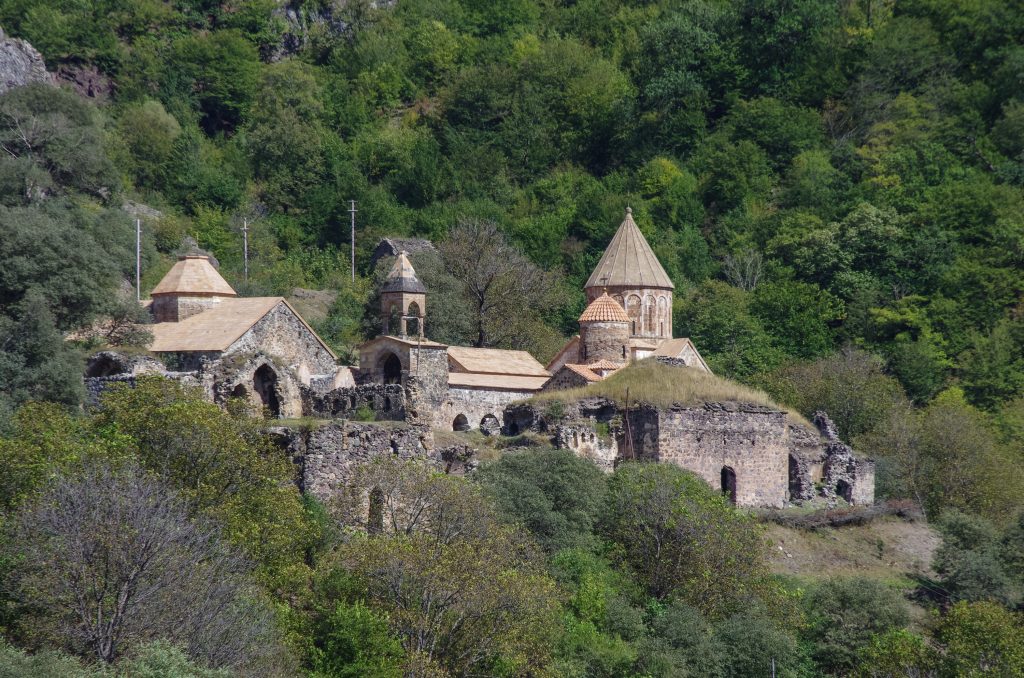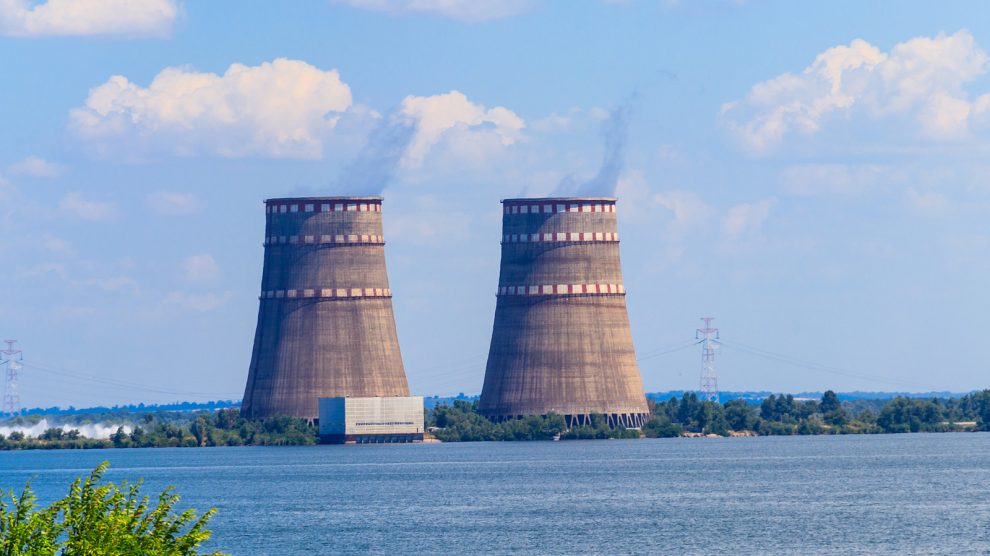Catch up quickly with the stories from Central and Eastern Europe that matter.
Russia’s war on Ukraine
International regulators are incapable of properly monitoring safety at the Russian-occupied Zaporizhzhia nuclear power station, according to a critical dossier compiled by Greenpeace that is being sent to western governments on Thursday.
The environmental campaign group concludes the International Atomic Energy Agency has too few inspectors at Europe’s biggest nuclear plant—four—and that there are too many restrictions placed on their access.
It argues that the IAEA is “unable to meet its mandate requirements” but it is not prepared to admit as much in public, and as a result what it describes as Russian violations of safety principles are not being called out.
Shaun Burnie and Jan Vande Putte, nuclear specialists at Greenpeace, conclude: “The IAEA risks normalising what remains a dangerous nuclear crisis, unprecedented in the history of nuclear power, while exaggerating its actual influence on events on the ground.”
The vast Zaporizhzhia nuclear power plant, with six reactors on site, was captured by Russia in early March 2022 and has been on the frontline of the war ever since. It is sited on the Dnipro River in central Ukraine and Ukrainian forces occupy the riverbank opposite, leaving the plant in the sights of both sides’ militaries.
Russia’s defence ministry on Thursday released a video showing the Black Sea Fleet’s commander at a conference, despite Ukraine claiming to have killed him.
It’s not clear when the footage, where Viktor Sokolov appears on a video link with the defence minister, was filmed.
The ministry said the meeting with senior officials happened on Tuesday.
Ukraine special forces said on Monday that Adm Sokolov and 33 other officers died in a missile strike on the fleet’s HQ in Sevastopol, occupied Crimea.
On Wednesday, a TV channel run by Russia’s defence ministry showed a video interview with Adm Sokolov, during which he said the fleet was performing successfully.
It was not clear when the clip was filmed.
Kyiv has not named the admiral directly, nor has it offered any evidence that he had died. It now says it is “clarifying” the reports.
“As it is known, 34 officers were killed as a result of a missile attack on the headquarters of the Black Sea Fleet of the Russian Federation,” Ukraine’s special forces said in a statement.
Brussels has warned European companies and governments that it could ban the sale of certain components to Turkey and other countries from where Iran and Russia are sourcing parts for drones and other weapons striking Ukrainian cities.
The comments from the European Commission follows a leak to the Guardian of a 47-page document in which the Ukrainian government detailed the use of western technology and appealed for long-range missiles to attack drone production sites in Russia, Iran and Syria.
The Ukrainian paper, submitted to the G7 governments in August, claimed there had been 600 raids on cities using unmanned aerial vehicles (UAVs) containing western technology in the previous three months.
Five European companies including a Polish subsidiary of a British multinational were named as the original manufacturers of the identified components.
There is no suggestion of any wrongdoing by the western companies whose parts were identified. “Iranian UAV production has adapted and mostly uses available commercial components, the supply of which is poorly or not controlled at all,” the paper said.

Dadivank, an Armenian medieval monastery in Nagorno-Karabakh
Other news from the region
The separatist government of Nagorno-Karabakh said on Thursday it will dissolve itself and the unrecognised republic will cease to exist by year’s end after a nearly three-decade bid for independence, while Armenian officials said over half of the region’s population has already fled. The moves came after Azerbaijan carried out a lightning offensive last week to reclaim full control over the region and demanded that Armenian troops in Nagorno-Karabakh disarm and the separatist government dissolve itself.
Kosovo on Monday observed a day of mourning for the Kosovar Albanian police officer killed by Serb gunmen in the north of the country. About 30 masked men in combat uniforms opened fire on a police patrol near the village of Banjska in the early hours of Sunday morning, killing one officer and injuring another. They then fled to a nearby Serbian Orthodox monastery, barricading themselves in with priests and visiting pilgrims. The stand-off ended when most of the assailants escaped on foot under cover of darkness on Sunday evening. Three of the gunmen were shot and killed by police.
Robert Fico, Slovakia’s three-time prime minister, has a chance to return to power in a closely fought early election on Saturday, raising the prospect of the central European country dropping its staunch support of neighbouring Ukraine. Fico’s SMER party has a narrow lead over liberal Progressive Slovakia (PS), which has pledged to stay the course on foreign policy, in two out of four final opinion polls. A government led by Fico’s party could forge an alliance with Hungarian leader Viktor Orbán, who has been an outlier on Ukraine and spars with the European Union over the rule of law.
Poland will introduce checks on vehicles crossing the border from Slovakia, the prime minister said on Monday, in measures to stem the flow of immigrants. The ruling Law and Justice (PiS) party has made migration a central issue in its campaign to win a third term in office in an October 15 election, and it has included questions on the topic in a referendum which will run alongside the vote. Meanwhile, Slovakia has been struggling with a surge in illegal migrants. The number of illegal migrants detained in Slovakia has increased nine-fold from a year ago to more than 27,000 so far this year.
Poland will bid to host the 2036 Summer Olympics, the country’s president, government and Olympic committee have announced. It will be up against Mexico, Indonesia and Turkey, which have already unveiled official bids, while India, China and Egypt have also expressed interest. “After holding consultations, it is our ambition to start efforts to hold the Summer Olympics in 2036,” announced President Andrzej Duda. “Our country is developing dynamically. We are convinced that by 2036 we will be ready to implement such a project in terms of infrastructure.”
Romania plans to buy 32 latest-generation F-35 fighter planes from US manufacturer Lockheed Martin, for 6.5 billion US dollars, the defence ministry said on Tuesday. Romania has raised defence spending to 2.5 per cent of gross domestic product this year from two per cent, in response to Russia’s invasion of Ukraine. Romania shares a 650 kilometre border with Ukraine, and has seen the conflict approach its borders as Moscow has repeatedly attacked Ukrainian ports across the River Danube. Last year it agreed to buy 32 second-hand F-16 fighter jets from Norway, to add to 17 acquired from Portugal since 2016.
A court in the city of Maladechna near Minsk began the trial of journalist Alyaksandr Mantsevich on Wednesday amid an ongoing crackdown on independent journalists and democratic institutions. The chief editor of Rehiyanalnaya hazeta (Regional newspaper) was arrested in mid-March and charged with discrediting Belarus and its government entities. The charge stems from the newspaper’s coverage of the political situation in the country in 2020-2023. Belarusian rights watchdogs have designated Mantsevich as a political prisoner.
The Foreign Affairs Committee of Estonia’s parliament proposed on Tuesday that the Russian exclave of Kaliningrad should be referred to by its historical name Königsberg from now on. The committee made the proposal to the Language Committee of the Estonian Language Society. Chairman Marko Mihkelson (Reform) said the committee found that using the Soviet-era name Kaliningrad in the Estonian language should be discontinued and the historic name Königsberg should be used instead. Mihkelson emphasized that Latvia, Lithuania, and Poland have already made similar moves.
Unlike many news and information platforms, Emerging Europe is free to read, and always will be. There is no paywall here. We are independent, not affiliated with nor representing any political party or business organisation. We want the very best for emerging Europe, nothing more, nothing less. Your support will help us continue to spread the word about this amazing region.
You can contribute here. Thank you.


